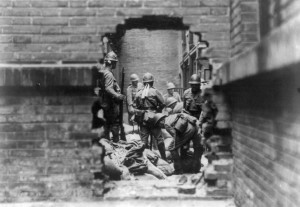The Forgotten Battle
- By Peter Harmsen
- 9 June, 2013
- 20 Comments
 When China and Japan clashed over Shanghai in the fall of 1937, their destinies were set on paths that would stretch decades into the future. From then on a state of total war existed between East Asia’s two most influential civilizations, and eventually even the western powers were dragged into the maelstrom, with geopolitical consequences that are felt to this day. The battle of Shanghai was one of the most dramatic events in Asia in the first half of the 20th century, and yet it has been overlooked by post-war historians, especially in the west.
When China and Japan clashed over Shanghai in the fall of 1937, their destinies were set on paths that would stretch decades into the future. From then on a state of total war existed between East Asia’s two most influential civilizations, and eventually even the western powers were dragged into the maelstrom, with geopolitical consequences that are felt to this day. The battle of Shanghai was one of the most dramatic events in Asia in the first half of the 20th century, and yet it has been overlooked by post-war historians, especially in the west.
Several possible explanations can be put forward to account for the curious fact that a part of Asian history with obviously enormous consequences has been all but erased from the collective memory. Could it be that the end of a war is always remembered more clearly than the beginning? Could it be that, since history is usually written by the winners, the triumphant conclusion of a war automatically becomes the moment that lives on? After all, it is significant that the two most lasting images of the Pacific War – the flag raising on Iwo Jima and the mushroom cloud over Hiroshima – are from the very last months of the conflict.
While that could indeed be part of the reason, in itself is not a satisfactory answer. Events early in the Pacific War have been remembered by America every year over the past seven decades ever since the war was a recent memory: Midway, the Bataan Death March, and of course Pearl Harbor, to mention just a few examples.  The 1937 image of the weeping infant at a bombed Shanghai railway station, too, belongs in this category, even though many may not know the exact background story of that picture.
The 1937 image of the weeping infant at a bombed Shanghai railway station, too, belongs in this category, even though many may not know the exact background story of that picture.
Another possibly more convincing reason why the battle of Shanghai – and by extension the entire early phase of the Sino-Japanese War – has been forgotten is the post-war silence of the combatants. Here the contrast with the west is startling. When the guns went silent in Europe, the generals on both sides retired to write their memoirs, from Bernard Law Montgomery to Heinz Guderian – and even, in the end, Georgy Zhukov. After all, there was no real use for their skills any longer. Peace had descended over Europe, and it would last, nearly uninterrupted, into the next century.
Asia was altogether different. After the end of hostilities in 1945, there was only a brief lull in the fighting before new conflicts arose. In China specifically, a civil war erupted between the Nationalist Chinese under Chiang Kai-shek, who had borne the brunt of the fighting at the front, and Mao Zedong’s Communists, who had been waging on-again, off-again guerrilla warfare against the Japanese but had otherwise been preserving their strength for the eventual struggle for control over China. There was simply no time for the Nationalist officers to write memoirs about the struggle against Japan.
Once the Chinese civil war ended with Communist victory in 1949, some Nationalist officers fled to Taiwan, while others stayed behind. The latter spent the following decades as non-persons, and it was only in the 1980s that a concerted effort was made to collect their memoirs. The result was a series of books of great value to the historian, but as they were written in Mandarin, western specialists on World War II were mainly prevented from utilizing them. The same was the case for the sources published on Taiwan. Language as a factor in preventing detailed knowledge to spread in the west about the war in China should not be underestimated.

 Copyright © 2024
Copyright © 2024
Leave a Reply to Anonymous Cancel reply